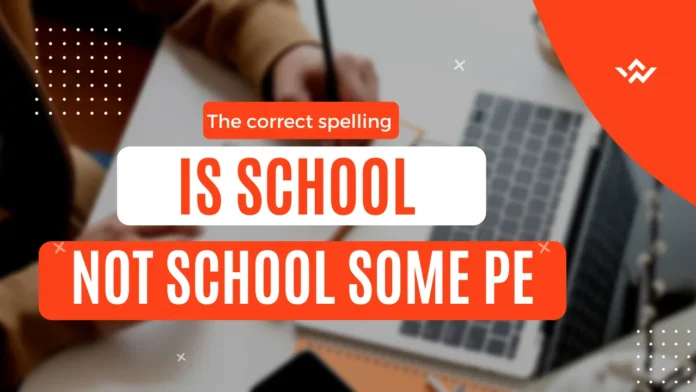Table of Contents
the correct spelling is school not school. some pe – tymoff Welcome to a comprehensive guide on navigating the educational landscape. In this guide, we’ll delve into various aspects of schooling, providing insights, tips, and essential information to help you make informed decisions.
Understanding the Importance of Education
the correct spelling is school not school. some pe – tymoff Education plays a pivotal role in shaping individuals and societies. It equips individuals with knowledge, skills, and values necessary for personal and societal development. Moreover, education fosters critical thinking, creativity, and problem-solving abilities, preparing individuals for the challenges of the modern world. the correct spelling is school not school. some pe – tymoff
The Evolution of Schooling the correct spelling is school not school. some pe – tymoff

Over the years, schooling has undergone significant transformations. From traditional classroom setups to online platforms, the landscape of education continues to evolve. This section explores the evolution of schooling and its implications for learners.
Navigating Different Types of Schools
Public Schools

Public schools are funded by the government and offer education to all students within a specific district. They adhere to state curriculum standards and are typically free for students.
Private Schools
the correct spelling is school not school. some pe – tymoff Private schools are privately funded institutions that may have religious affiliations or follow specific educational philosophies. While they often require tuition fees, they may offer unique educational approaches and smaller class sizes. the correct spelling is school not school. some pe – tymoff
Homeschooling
Homeschooling involves educating children at home, typically by parents or tutors. It offers flexibility and personalized learning experiences but requires careful planning and dedication. the correct spelling is school not school. some pe – tymoff
Charter Schools
Charter schools are publicly funded but operate independently, often with a specific focus or educational approach. They have more autonomy than traditional public schools but must meet performance standards outlined in their charter.
The Role of Technology in Education

Technology has revolutionized education, providing access to vast resources and enabling innovative teaching methods. From interactive learning apps to virtual classrooms, technology enhances the learning experience and prepares students for a digital future.
Overcoming Challenges in Education
While education offers numerous benefits, it also faces challenges such as inequity, resource constraints, and outdated curricula. Addressing these challenges requires collective effort and innovative solutions to ensure equal opportunities for all learners.
Supporting Student Well-being
In addition to academic success, schools play a crucial role in supporting students’ social, emotional, and physical well-being. This section explores strategies for promoting a positive school environment and fostering holistic development.
FAQs (Frequently Asked Questions)
How do I choose the right school for my child? Choosing the right school involves considering factors such as educational philosophy, location, extracurricular activities, and academic reputation. Visit prospective schools, talk to teachers and administrators, and involve your child in the decision-making process.
What resources are available for homeschooling parents? Homeschooling parents can access a wide range of resources, including online curriculum providers, educational materials, local homeschooling groups, and support networks. Additionally, many libraries offer homeschooling resources and activities for children.
How can technology enhance the learning experience? Technology offers various tools and resources to enhance the learning experience, such as interactive simulations, educational games, multimedia presentations, and virtual field trips. Additionally, online platforms provide access to educational content anytime, anywhere, catering to diverse learning styles.
What are the benefits of extracurricular activities in schools? Extracurricular activities offer numerous benefits, including promoting social skills, teamwork, leadership, and time management. They provide opportunities for students to explore their interests, develop talents, and build a sense of belonging within the school community.
How can schools support students’ mental health? Schools can support students’ mental health by promoting a positive school climate, providing access to counseling services, implementing social-emotional learning programs, and creating a supportive environment where students feel valued and heard.
What are the key trends shaping the future of education? Key trends shaping the future of education include personalized learning, competency-based education, lifelong learning, digital literacy, and the integration of emerging technologies such as artificial intelligence and virtual reality.
Conclusion
Education is a transformative force that empowers individuals and shapes societies. By understanding the diverse landscape of schooling and embracing innovative approaches, we can ensure that every learner receives a quality education that prepares them for success in the 21st century.
Read Also: Mary Joan Martelly: Unveiling the Story of a Visionary Leader 2024
